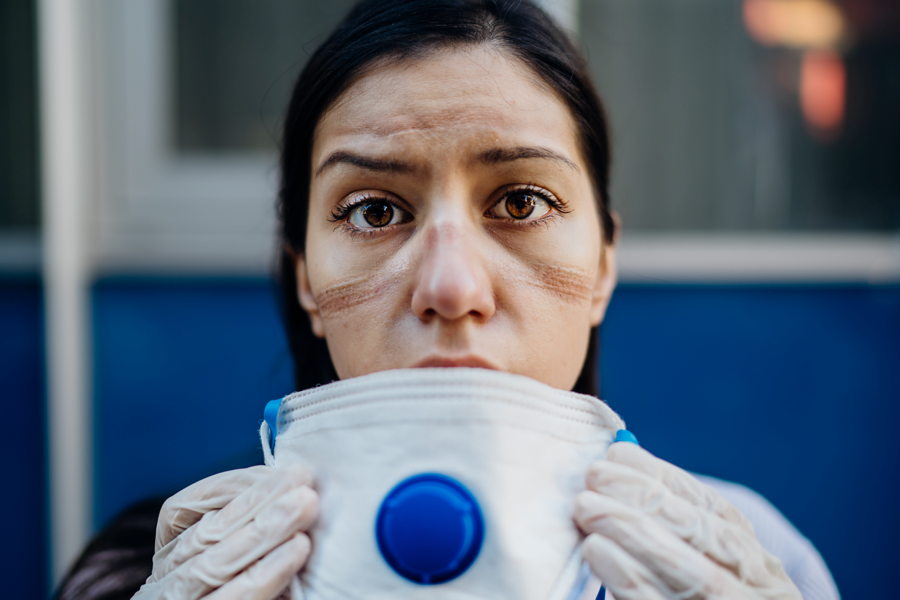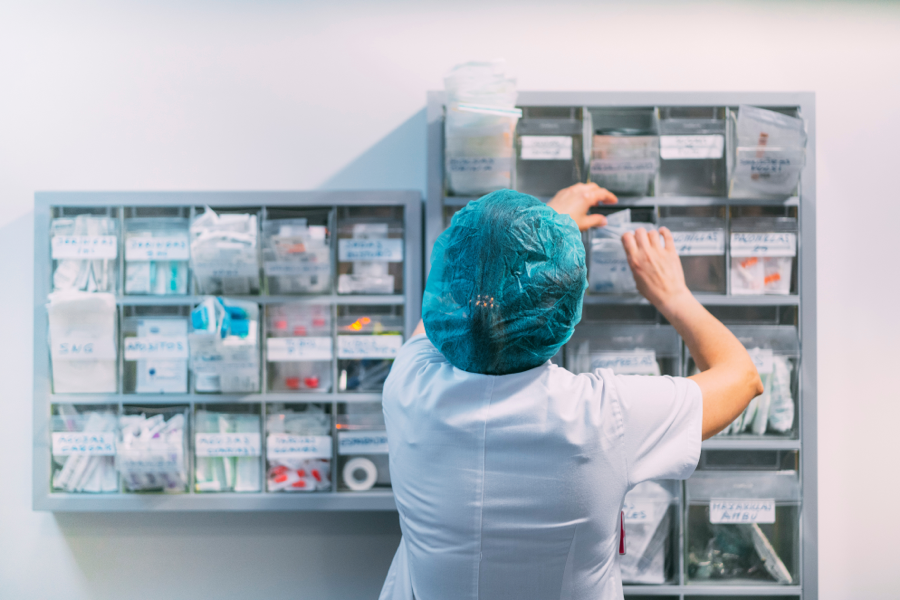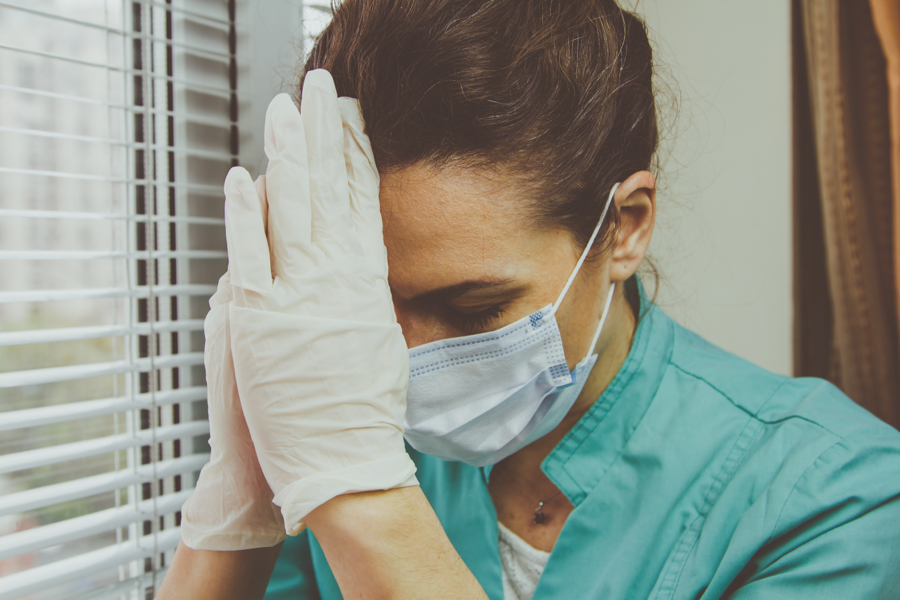
HEALTH & WELLNESS
Five Ways Nurses Can Prevent Dry Hands
-
 EveryNurse Staff
EveryNurse Staff
- Last Updated: 05/16/2019
Nursing is hard on your body in many ways. From having to move patients to spending countless hours on your feet, the profession can take a toll on you. Your hands are one part of your body that suffers greatly, usually due to frequent handwashing practices, harsh soaps and chemicals, and powdered latex or nitrile gloves that are commonly used by nurses across the country. If your hands are constantly dry, explore these easy ways to heal your skin.
1. Use Cool Water, Not Hot
When washing your hands at work, try to ignore the temptation to wash your hands with hot water and dial down the temperature instead. Plenty of soap and good hand-washing techniques will still kill unwanted germs, helping to prevent the spread of bacteria and infection, which is critical for the healthcare industry. While you don’t have to stick your hands under an ice-cold faucet to do the trick, cool or warm water helps keep your skin from drying out. Washing your hands repeatedly with hot water can strip your skin’s natural moisture, which can compound with other causes of dryness to make your hands tight, itchy, hot, and uncomfortable.
2. Avoid Alcohol-Based Soaps
What soap you use plays a significant role in how dry your hands get while washing them at work. As a nurse, you wash your hands multiple times a day, which in and of itself can leave your skin feeling parched and raw. Couple that with a soap that has drying agents in it like alcohol or fragrance and you have a recipe for discomfort. Use soap that helps replace your skin’s moisture when you wash and avoid soap that has alcohol, heavy perfumes, and dyes.
3. Don’t Rub When Drying Your Hands
When drying your hands with a paper towel after you wash them, be sure to blot gently instead of rubbing. Rubbing your skin with a rough paper towel when your hands are sore, cracked, and red can feel particularly unpleasant at best and can even worsen symptoms of dryness or cause skin to break open. Skip hand dryers in restrooms, since the hot air they expel can be even harder on your hands than paper towels. Another consideration is to simply shake the water from your hands and allow them to air dry unless you’ll be putting on gloves directly after washing your hands.
4. Wear Gloves Under Your Gloves
Powdered latex and nitrile gloves can be rough on the skin, but it’s not feasible to simply opt out of wearing them in the medical profession, because they protect your hands from bodily fluids and infection. Some brands of gloves are treated with a moisturizer to prevent dryness and chafing when wearing gloves frequently, so it may benefit you to ask the department that orders supplies if these can be purchased. You may also want to consider wearing very thin, snug cotton gloves under your latex or nitrile gloves to protect your skin from coming into contact with the powder. However, this may not work for nurses who use their fine motor skills frequently on the job.
5. Use a Heavy-Duty Moisturizer
Follow up your hand-washing routine with a good moisturizer. Hands that take the abuse of the nursing profession need much more than a basic or lightweight lotion. Instead, look for thick, repairing lotions, heavy hand creams, or even ointments like Aquaphor or Bag Balm. Keep a small tube of your favorite moisturizer in your pocket to reapply frequently, ideally after every time you wash your hands. Allow your hands to dry completely after applying moisturizer before putting on gloves.
Additional Tips for Repairing Dry, Cracked Hands
Treat Split or Broken Skin
After your hands are clean and dry, inspect them for sores and broken skin. Treat any wounds with a liquid bandage to prevent further damage to your skin. Traditional bandages often don’t work because they come off the very next time your hands are washed, while liquid bandages are generally waterproof. However, if a liquid bandage doesn’t work for you, look for water-resistant bandages and keep a few in the pocket of your scrubs since you’ll be replacing them often. Don’t moisturize before you treat any broken skin — the moisturizer will prevent bandages from sticking to your skin.
Be Good to Your Hands on Your Days Off
When you’re not working, it’s important to take extra care of your hands. Wash less frequently, limiting it to only when necessary, like after handling raw meats or using the restroom. Use moisturizer more frequently and avoid tasks that require you to work heavily with your hands if they are very dry, uncomfortable, or cracked. Use your days off to work on restoring your hands’ natural moisture balance, so they can continue to tolerate regular washing and gloves when you’re on the job.
Repair Your Hands While You Sleep
A great way to speed up the healing of your hands is to apply ointment, moisturizer, or a combination of the two in a thick layer to your hands before you go to sleep. Slip on a pair of cotton gloves (they don’t have to be as tight as those you wear under your latex or nitrile gloves) and sleep with the ointment on your hands for the night. When you wake up, your hands should be softer, and dryness, redness, and cracks less visible.
When to See a Dermatologist
If your hands don’t respond to the above dry skin treatments, it’s time to book an appointment with a dermatologist. A doctor can evaluate your condition to determine if anything beyond your profession may be causing your dry skin and make treatment recommendations. Special creams or ointments may be prescribed.
Dry hands are a common problem for hardworking nurses, but in most cases, dryness, cracks, and discomfort are treatable with a little extra effort. Use the tips above to heal chapped, broken skin and to prevent dryness when you’re on the job.





















